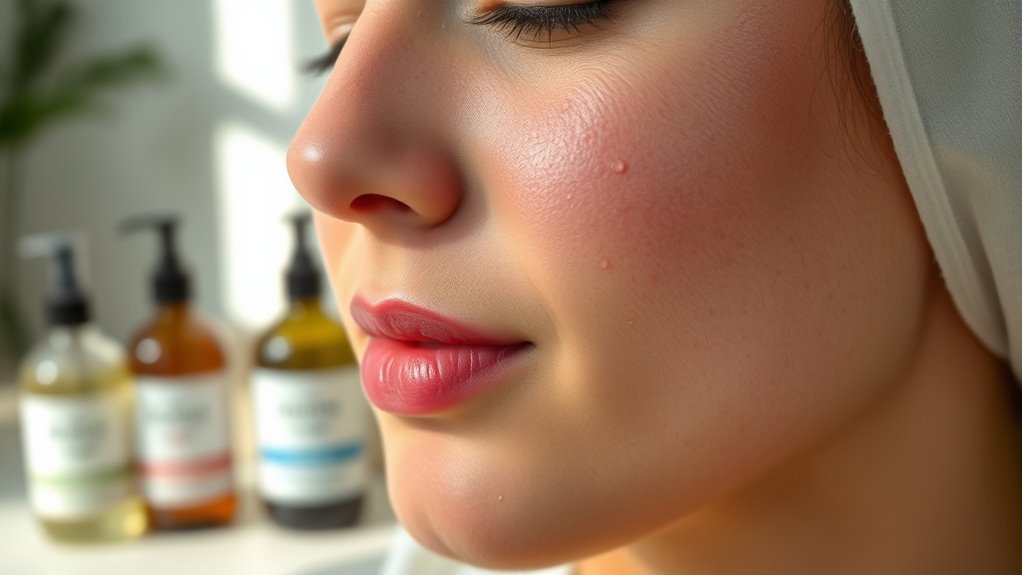Pregnancy acne affects over 40% of expectant mothers, mainly due to hormonal fluctuations, particularly increased progesterone. This surge makes your oil glands more active, leading to clogged pores and breakouts. You might notice acne on your face, neck, chest, or back at any stage of pregnancy. Safe treatments include glycolic and azelaic acid, while certain medications should be avoided. By making lifestyle changes, like managing stress and hydrating, you can help your skin. There’s more to explore about effective care options.
Key Takeaways
- Hormonal fluctuations during pregnancy, particularly increased progesterone, lead to heightened oil production and acne breakouts.
- Breakouts can occur on various body parts, including the face, neck, chest, and back.
- Safe treatment options for pregnancy acne include glycolic acid, azelaic acid, and topical antibiotics like erythromycin.
- Avoid treatments such as retinoids, oral tetracycline, and salicylic acid due to potential risks to the fetus.
- Maintaining a balanced diet and managing stress can significantly improve skin health during pregnancy.

If you’re pregnant and struggling with acne, you’re not alone—over 40% of expectant mothers experience this common skin issue. It can be frustrating to deal with, especially when your body is already going through so many changes. Acne can pop up on your face, neck, chest, or back, often manifesting as painful nodular acne that can lead to scarring. The hormonal fluctuations during pregnancy, particularly the increase in progesterone, play a significant role in this skin condition.
Over 40% of pregnant women face acne due to hormonal changes, making this common issue even more frustrating.
As your progesterone levels rise, your oil glands become more active, leading to clogged pores that can trigger breakouts. If you’ve had a history of acne, you’re more likely to see it return during this time. Stress and diet can exacerbate your skin’s condition, as changes in your immune system also affect skin balance. The overall shifts in your body can contribute to the onset of acne at any stage of your pregnancy, but it often resolves itself after childbirth.
When it comes to treating pregnancy acne, you’ll want to be cautious. Some treatments are safe, while others can be harmful. Options like glycolic acid and azelaic acid can help reduce discoloration and inflammation, making them suitable for expectant mothers. Topical antibiotics, like erythromycin, are also safe to use.
However, always consult your healthcare provider before starting any new treatment, as they can guide you in choosing the right options for your skin.
On the flip side, some treatments are definitely off-limits during pregnancy. Retinoids and isotretinoin are known to cause severe birth defects and should be avoided at all costs. Oral tetracycline can affect fetal teeth and bones, making it unsafe. Hormonal therapies and salicylic acid are also generally advised against due to potential risks.
You can make some lifestyle adjustments to help manage your acne during this time. Eating a balanced diet rich in fruits, vegetables, and whole grains can be beneficial. Incorporating stress management techniques, like light exercise or relaxation, may help reduce breakouts triggered by stress.
Staying hydrated is also vital, as it prevents excessive oil production. Regularly washing your face with gentle cleansers and minimizing contact with irritants can further support your skin’s health.
Frequently Asked Questions
Can Pregnancy Acne Affect the Baby’s Health?
No, pregnancy acne itself doesn’t affect your baby’s health.
It’s mainly caused by hormonal changes and is quite common among pregnant individuals. While the acne can be bothersome, it resolves after childbirth as hormone levels stabilize.
However, you should be cautious with treatments, as some can pose risks. Always consult your healthcare provider before using any acne products to ensure they’re safe for both you and your baby.
Is Pregnancy Acne Permanent After Childbirth?
They say, “This too shall pass.”
When it comes to pregnancy acne, it typically isn’t permanent after childbirth. Most women notice improvement within weeks post-delivery as hormone levels stabilize.
However, some may experience postpartum acne due to hormonal shifts. While it’s usually temporary, sticking to a skincare routine and consulting a dermatologist for persistent issues can help.
Are There Specific Foods That Worsen Pregnancy Acne?
Yes, certain foods can worsen acne during pregnancy. You should be cautious with cow milk and cheese, as they may trigger breakouts.
Iodine-rich foods like seafood and table salt can irritate your skin, while soy products might interfere with hormones, leading to acne.
Also, high-androgen foods can contribute to breakouts. It’s best to identify and limit these triggers to help manage your skin during this time.
How Does Hormonal Change Cause Pregnancy Acne?
Hormonal changes during pregnancy significantly impact your skin.
As your body experiences increased progesterone and androgen levels, oil production ramps up, clogging pores. This excess sebum, combined with dead skin cells, leads to breakouts like pimples and cysts.
Additionally, your skin may become more sensitive, making it prone to irritation.
Understanding this hormonal influence can help you manage and treat your acne effectively during this time.
Can Stress Increase the Severity of Pregnancy Acne?
Yes, stress can definitely increase the severity of your pregnancy acne.
When you’re stressed, your body produces more stress hormones, which can stimulate oil production and lead to inflammation. This can make existing acne worse and may even trigger new breakouts.
Managing your stress through techniques like meditation, exercise, or deep breathing can help keep your skin clearer and improve your overall well-being during this time.
Conclusion
As you navigate the beautiful yet challenging journey of pregnancy, remember that your skin’s changes are just one part of this transformative experience. Embrace the glowing moments and the occasional bumps along the way, like a blooming flower facing the sun. With care and patience, you can soothe the storms of pregnancy acne, allowing your natural beauty to shine through. So, cherish this time, and let the love you feel for your growing baby radiate from within.









